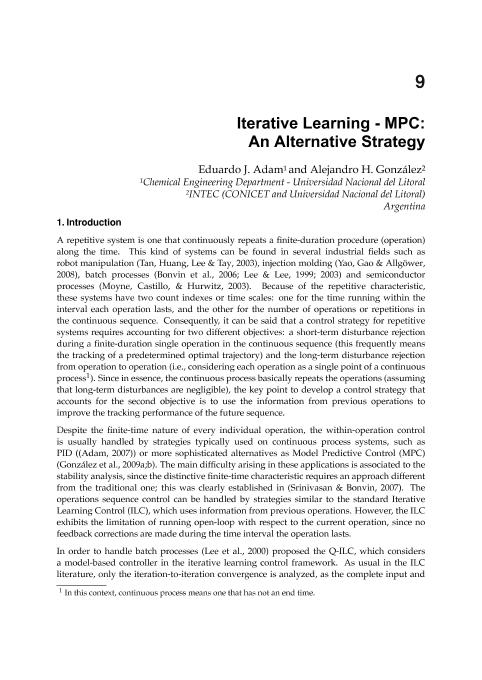Mostrar el registro sencillo del ítem
dc.contributor.author
Adam, Eduardo Jose

dc.contributor.author
González, Alejandro Hernán

dc.contributor.other
de Oliveira Serra, Ginalber Luiz
dc.date.available
2020-07-24T15:48:00Z
dc.date.issued
2012
dc.identifier.citation
Adam, Eduardo Jose; González, Alejandro Hernán; MPC with learning properties applied to finite-horizon repetitive systems; IntechOpen; 2012; 193-213
dc.identifier.isbn
978-953-51-0677-7
dc.identifier.uri
http://hdl.handle.net/11336/110188
dc.description.abstract
A repetitive system is one that continuously repeats a finite-duration procedure (operation) along the time. This kind of systems can be found in several industrial fields such as robot manipulation ((Tan, Huang, Lee & Tay, 2003)), injection molding ((Yao, Gao & Allgöwer, 2008)), batch processes ((Bonvin et al., 1984; Lee & Lee, 1999)) and semiconductor processes ((Moyne, Castillo, & Hurwitz, 2003)). Because of the repetitive characteristic, these systems have two count indexes or time scales: o e for the time running within the interval each operation lasts, and the other for the number of operations or repetitions in the continuous sequence. Consequently, it can be said that a control strategy for repetitive systems requires accounting for two different objectives: a short-term disturbance rejection during a finite-duration single operation in the continuous sequence (this frequently means the tracking of a predetermined optimal trajectory) and the long-term disturbance rejection from operation to operation (i.e., considering each operation as a single point of a continuous process1). The MPC proposed in this Chapter is formulated under a closed-loop paradigm ((Rossiter, 2003)). The basic idea of a closed-loop paradigm is to choose a stabilizing control law and assume that this law (underlying input sequence) is present throughout the predictions. More precisely, the MPC propose here is an Infinite Horizon MPC (IHMPC) that includes an underlying control sequence as a (deficient) reference candidate to be improved for the tracking control. Then, by solving on line a constrained optimization problem, the input sequence is corrected, and so the learning updating is performed.
dc.format
application/pdf
dc.language.iso
eng
dc.publisher
IntechOpen

dc.rights
info:eu-repo/semantics/openAccess
dc.rights.uri
https://creativecommons.org/licenses/by-nc-sa/2.5/ar/
dc.subject
MODEL PREDICTIVE CONTROL
dc.subject
REPETITIVE SYSTEMS
dc.subject
LEARNING PROPERTIES
dc.subject.classification
Otras Ingenierías y Tecnologías

dc.subject.classification
Otras Ingenierías y Tecnologías

dc.subject.classification
INGENIERÍAS Y TECNOLOGÍAS

dc.title
MPC with learning properties applied to finite-horizon repetitive systems
dc.type
info:eu-repo/semantics/publishedVersion
dc.type
info:eu-repo/semantics/bookPart
dc.type
info:ar-repo/semantics/parte de libro
dc.date.updated
2020-06-16T13:38:35Z
dc.journal.pagination
193-213
dc.journal.pais
Croacia

dc.description.fil
Fil: Adam, Eduardo Jose. Consejo Nacional de Investigaciones Científicas y Técnicas. Centro Científico Tecnológico Conicet - Santa Fe. Instituto de Desarrollo Tecnológico para la Industria Química. Universidad Nacional del Litoral. Instituto de Desarrollo Tecnológico para la Industria Química; Argentina
dc.description.fil
Fil: González, Alejandro Hernán. Consejo Nacional de Investigaciones Científicas y Técnicas. Centro Científico Tecnológico Conicet - Santa Fe. Instituto de Desarrollo Tecnológico para la Industria Química. Universidad Nacional del Litoral. Instituto de Desarrollo Tecnológico para la Industria Química; Argentina
dc.relation.alternativeid
info:eu-repo/semantics/altIdentifier/url/https://www.intechopen.com/books/frontiers-in-advanced-control-systems
dc.relation.alternativeid
info:eu-repo/semantics/altIdentifier/url/https://www.intechopen.com/books/frontiers-in-advanced-control-systems/iterative-learning-mpc-an-alternative-strategy
dc.conicet.paginas
278
dc.source.titulo
Frontiers in Advanced Control System
Archivos asociados
